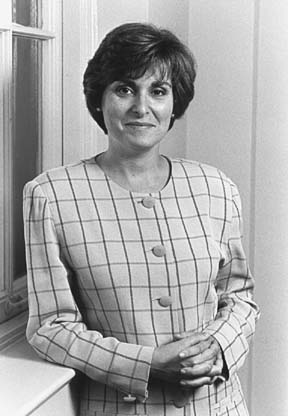
Vice-Principal Phyllis Heaphy
November 7, 1996
by Sylvain Comeau
 Vice-Principal Phyllis Heaphy |
On October 24, Vice-Principal (Administration and Finance) Phyllis Heaphy went directly to students for the first time to discuss with them some of the constraints faced by McGill in the current budget situation.
Heaphy opened her presentation to SSMU Council with the positive news that the Bookstore generated $500,000 in profits last year. Annual revenues are being used to pay down the construction cost (the building was put up in 1989, at a cost of $4.5 million), and McGill expects it will be paid off by the academic year 2009-10. Once the building is paid for, profits from the Bookstore will go to the Students' Society.
Heaphy revealed that the University has recently received surprising, "totally unsolicited" offers which may shorten the pay-down period. The first came in August, from U.S. publishing and bookstore management chain Barnes & Noble.
"Barnes & Noble have offered to come and manage the store for us, with a guarantee of a million dollars in profit per year for six years." Soon after, a similar offer came from Follett, another large U.S. chain.
Heaphy is also expecting a third offer--"we are very popular, and word gets around"--from La Fédération des coopératives québécoises en milieu scolaire, which runs most Quebec university bookstores. To aid in its decision, the University hired a chartered accountancy firm to act as consultants. The firm will present a report and recommendations on November 11.
The bookstore chains have proposed that they would increase the profit margin on books from 20% to 23%; "however, they argue that students would end up saving money overall, because there would be far more used textbooks for sale. So while certain books would be more expensive, certain others would be less expensive. We will evaluate that statement."
Heaphy also provided SSMU with a more global view of the overall budget picture. She stated that the government funding cut for 1996-97 will amount to $14.5 million, slightly more than the $14.2 million announced in September.
The University's "worst best guess" at the moment for 1997-98 is a cut of $18 million.
"We have no idea yet; it could be a little bit more, a little bit less, or a lot more. I highly doubt that it will be a lot less, however, because the government is spreading enough rumours out there to prompt us to prepare ourselves for those kinds of numbers."
If the $18 million figure proves correct, provincial cuts for the period 1992-93 to 1997-98 will amount to a total of $54 million, or 27% of the $203 million per year in provincial funding six years ago.
Heaphy put the $18 milllion figure in perspective.
"What does that mean? It is $3 million more than the entire library budget this year; it is $3 million more than the Faculty of Engineering budget. It is equal to the budget of the faculties of Management and Education combined."
If that kind of cut must be absorbed, "the quality of the University will suffer. It is the opinion of the deans of the faculties, the vice-principals and the principal that this is it. This next $18 million cut is really going to make a difference. And if the quality of this University goes down, the value of your degree--and mine, because I'm also a McGill graduate--will go down, as well."
Heaphy predicted that, if there is a drop in quality, some people may simply go elsewhere. "A lot of people will be happy to go elsewhere and pay a lot more, because they came for quality, and they'll go for quality where they can find it."
Heaphy noted that McGill compares itself to other "research-intensive" universities in Canada, notably UBC, University of Toronto, Queen's, Waterloo, and University of Western Ontario.
"Today, their tuition fees average $2,826, which is about $1,200 more than Quebec students pay. These universities, as far as we know, are anticipating further significant increases next year, and the year after."
McGill wants to raise service fees next year, Heaphy says, which will translate into visible improvements at the University.
"There is no magic to this; if you spend more per student, you get more, and in very tangible ways. You get more and better professors, better libraries, more computers, and smaller classes." She added that the eventual goal is to raise fees to the Canadian average, but only in a gradual, step-by-step process.
"We know that doing it in one shot would be too much of a burden for students." The University is proposing a new Academic Services Fee, "the purpose of which would be to maintain ourselves, and hopefully improve in certain areas."
She pointed out that a $200 increase in student fees, for example, would yield $4-$5 million for the University and added that 20%-25% of any revenue generated by an increase would be put aside for additional student aid.
If, for some reason, the University cannot raise fees next year, "we hope not to reduce the professoriate much further than it is. If we have to think of cutting, we would consider first making cuts in areas such as the libraries, computing services, and academic advising."
Heaphy is aware that students would prefer that the University trim fat rather than raise fees. But she argued that there is little fat left to trim.
"We have already made a lot of cuts, and our administrative costs are the lowest among Quebec universities. That is recognized by the government. Nearly 25% of the McGill administration was cut last year alone."